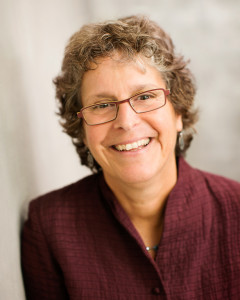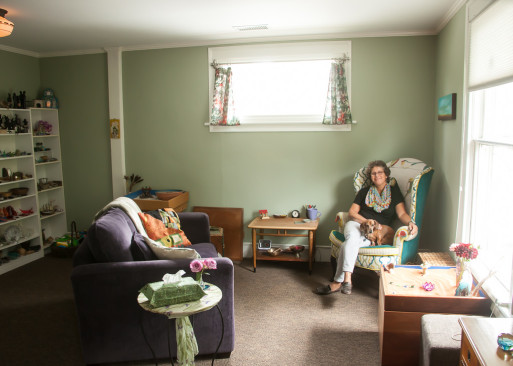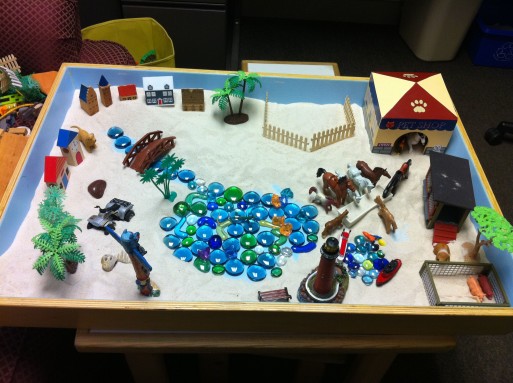Today SevenPonds is speaking with Gaby Donnell, Licensed Clinical Social Worker and co-founder of Motheroots Counseling, based in Portland, Oregon. Motheroots provides counseling services to adults in their childbearing years, helping them deal with issues around fertility, loss of pregnancy, death of a child, postpartum depression, maintaining healthy adult relationships and parenting approaches.

Gaby Donnell
(Credit: campbellsalgado.com)
Juniper: Motheroots provides counseling throughout the journey of conception, pregnancy, childbirth, and postpartum adjustment. How did you get your start in this field?
Gaby: Prior to starting Motheroots, I worked primarily as a play therapist with children who had been abused or in domestic violence situations. When I was pregnant, I began seeking out supportive resources for new parents, and all I could find was a prenatal yoga class. I was studying and using the sand tray method at the time, and I began researching the training I would need to work with people during the childbearing years. I met Winnie Davis, a woman here in Portland, who started an organization called Baby Blues Connection. She is a psychologist who had postpartum depression — her website is called Postpartum Support International. It provides training around postpartum issues to social workers, counselors and doctors.
I started Motheroots in 1996. One of my first clients was a couple whose baby died at 28 weeks, and they were my first teachers in dealing with infant loss. Although I’d worked with grief, this was new to me.
Juniper: Can you tell me a little more about Baby Blues Connection — how it affected your professional development?
Baby Blues Connection is a local group that provides services and training to postpartum women who have anxiety and depression. My work with them includes providing free training around issues related to pregnancy, postpartum, loss and fertility. It’s a great support for people who seek a group to accept and support them through the challenges — as much as the joys — of parenting.
Juniper: At Motheroots, you address not only prepartum anxiety and postpartum depression, but also fertility issues, loss of pregnancy, and stillbirth. In what situations might your clients require a facilitated grieving process across the related topics that you specialize in?
Gaby: Let’s begin with the most observable trauma: stillbirth — grieving the loss of a child you won’t get to raise, and the trauma of sudden death. Not everyone seeks out counseling assistance during this time, but the ones who do have found it helpful. Part of what Motheroots does is refer clients to other organizations that provide ongoing support.

Gaby in her element at Motheroots
(Credit: campbellsalgado.com)
Juniper: What about grieving processes related to a parent’s or hopeful parent’s own childhood trauma? Do you provide counseling regarding how this would affect an individual’s parenting approach?
Gaby: Yes. People often seek us out because they grew up in a dysfunctional family environment or because they experienced sexual or physical abuse. They want to provide a loving, caring environment for their child, but find that they don’t have the skills from their own upbringing to navigate that. We help individuals live the values they have established, and then actualize the ways in which they want to raise their children.
Part of that process is addressing reactive ways of responding to outer stimuli. For example, if someone was raised in a very strict environment, their tendency may be toward embodying the opposite instead of approaching parenting from a place of balance and guidance. This can be difficult for anyone whose upbringing was extreme in one way or the other.
Juniper: When you are working with childhood trauma in adults, do you ever work back more than one generation to address ancestral trauma?
Gaby: Absolutely. Sometimes that’s conscious and sometimes not. There’s an interesting body of literature that is currently growing, called epigenetics. Sometimes (I think, all the time) our experiences change our genetic makeup. That is, trauma, as well as experiences that are nourishing, replenishing and healing, change our genetics. Some of these early habits of mind and behavior go back to our cultural histories, and when we address those things, we change our culture.
It’s like the evolution of dropping a tail that we no longer need. When we drop habits that no longer serve us — habits around responding to fear, for example — we can stop causing harm to ourselves and others through these unconscious reactions that are no longer serving us.

Sand tray therapy
(Credit: meredithkrugellcsw.com)
Juniper: What are some approaches or helpful ideas you might employ to guide an individual in shifting from the grief of pregnancy or infant loss into openness toward a new pregnancy or adoption, given that this is the client’s ultimate goal?
Gaby: First, I have to say that everyone navigates grief in different ways, and people are so different. I listen for what has been a guide for someone in the past, whether that is a religious or spiritual practice, making art or being in nature. These things can be anchors to help us move forward with more ease and less suffering. Sand tray, for example, is a technique in which a person can step back and look at the larger picture of what’s happening, using symbolic, tangible items that have particular meaning to them. For example, a toy tiger can mean a million different things to a million different people, but when someone chooses to ascribe a particular meaning to it for the purpose of working with a sand tray, that item represents something very personal for them in relation to the other items there.
We can get stuck in our trauma by not seeing the whole of the situation, such as when a child dies and the parent is devastated, but may not realize that there is still an underlying desire to have another child. Alternatively, we can get so attached to what we believe we want that we lose touch with our authentic desires. When we use mindfulness techniques like sand tray or art or being in nature, it allows for our natural wisdom and insight to come through in our awareness, and we will be more satisfied with our lives.
When a grieving parent is dealing with a subsequent pregnancy, my recommendation is that they not “white knuckle it,” but rather meet this as a new experience. We do a lot of work around that.
Please check back next week for the second part of our interview with Gaby.

 Can Counseling Help Heal Childhood Trauma, Grief and Loss? An Interview with Gaby Donnell, Part One
Can Counseling Help Heal Childhood Trauma, Grief and Loss? An Interview with Gaby Donnell, Part One


 Funeral Home Owner Chris Johnson Spending Halloween in Jail
Funeral Home Owner Chris Johnson Spending Halloween in Jail
 Our Monthly Tip: Toast a Loved One with a Personalized Glass
Our Monthly Tip: Toast a Loved One with a Personalized Glass
 My Cousin’s Death Taught Me the Meaning of Life
My Cousin’s Death Taught Me the Meaning of Life














